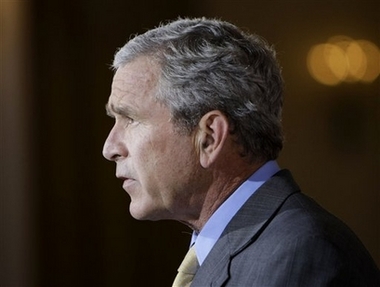Bush calls Mideast peace conference
(AP)Updated: 2007-07-17 08:32
WASHINGTON - Declaring a "moment of choice" in the Middle East, President Bush said Monday he would call Israel, the Palestinians and others in the region to a peace conference aimed at restarting stalled talks and moving faster toward a Palestinian state.
 President Bush delivers remarks on the Israeli-Palestinian Issues, Monday, July 16, 2007, in the Cross Hall of the White House in Washington. [AP]  |
Bush said the conference, open to countries in the region that support a two-state solution to the long Israeli-Palestinian standoff, would be headed by Secretary of State Condoleezza Rice.
He also pledged more US financial support for the moderate Palestinian government of Mahmoud Abbas and called for the convening of a group of "donor" countries to increase international financial aid, including Saudi Arabia, Egypt and Jordan.
In an appeal directed at the divided Palestinian people, Bush drew a contrast between what he said life would be like under an Abbas government and under the rule of the Islamic militant group Hamas, which gained authority over Gaza in June. Abbas now controls only the West Bank.
"This is a moment of clarity for all Palestinians. And now comes a moment of choice," Bush said in a speech intended to signal a new resolve on the part of his administration to help restart the stalled peace process.
"Iraq is not the only pivotal matter in the Middle East," Bush said.
He said that many changes had come, "some hopeful, some dispiriting," in the more than five years since he became the first US president to voice full, open support for a separate, independent Palestine alongside Israel.
He said Abbas and his new prime minister, Salam Fayyad, "are striving to build the institutions of a modern democracy" while Hamas "has demonstrated beyond all doubt that it is devoted to extremism and murder."
Only the Palestinians can decide which of these two paths to follow, Bush said.
His remarks drew taunts from Hamas.
In Gaza, Hamas spokesman Sami Abu Zuhri said, "Bush's statements come in the context of garnering support for Abbas to fight Palestinian legitimacy, represented by Hamas."
"We affirm that all promises made by Bush are false promises. The promise to form a Palestinian state is old. It will not be implemented. The opposite, instead, has happened. Instead of two states, he has divided our people into two governments," said the Hamas spokesman.
Israel welcomed Bush's remarks. "We share his vision of two states and the need to support the moderate Palestinians who believe in peace," said Israeli Foreign Ministry spokesman Mark Regev. "Moving forward in the peace process demands zero tolerance for terrorism," Regev added.
Bush voiced strong support for Abbas and his moderate government. He noted that the United States has pledged more than $190 million in direct assistance to the Palestinians, most of it already approved, and that the Overseas Private Investment Corporation, a quasi-governmental unit, was making another $228 million available in loan guarantees.
Bush also announced that his administration would "make a direct contribution of $80 million to help Palestinians reform their security services."
Administration officials said that Bush weighed recommendations from former British Prime Minister Tony Blair in deciding whether to pledge additional sums.
Blair was recently named as special envoy to the region by the "Quartet" of Mideast peace makers - the US, European Union, United Nations and Russia. Blair will meet with Rice and her Quartet counterparts in Portugal on Thursday.
White House spokesman Tony Snow said, "With all this assistance, we are showing the Palestinian people that a commitment to peace leads to the generous support of the United States."
The fall conference would be a dramatic way to try to jump-start the peace
process, a rare session among Israel and some Arab states that do not have
formal diplomatic relations with Israel.
| 1 | 2 |  |
|
|
|
||
|
||
|
|